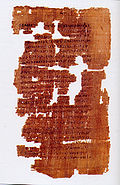
Back Apocalipsi Gnòstic de Pere Catalan Apocalipsis gnóstico de Pedro Spanish آخرالزمان گنوسی پیتر Persian Gnostilainen Pietarin ilmestys Finnish Gnostyske Iepenbiering fan Petrus Frisian Apocalisse di Pietro (copta) Italian Apôkalipsy Gnôstikan' i Petera Malagasy Gnostische Openbaring van Petrus Dutch Den gnostiske Peters apokalypse NB Gnostycka Apokalipsa Piotra Polish

 |
| Part of a series on |
| New Testament apocrypha |
|---|
 |
|
|
The Gnostic Apocalypse of Peter, also known as the Coptic Apocalypse of Peter and Revelation of Peter, is the third tractate in Codex VII of the Nag Hammadi library. The work is associated with Gnosticism, a sect of early Christianity, and is considered part of the New Testament apocrypha and a work of apocalyptic literature. It was likely originally written in the Koine Greek language and composed around 200 CE. The surviving manuscript from Nag Hammadi is a poor-quality translation of the Greek into Coptic, and likely dates from the 4th century.
The work's author is unknown, although it is purportedly written by the disciple Peter (pseudepigrapha) describing revelations given to him during Holy Week. Jesus tells Peter "through you I have begun a work for the remnant whom I called to knowledge (gnosis)"[2] and reveals secrets of the future. The work criticizes other Christian groups, comparing them to the blind and deaf. Jesus says that false Christians (presumably the proto-orthodox movement) will hold power for a time, and that they will be haughty, oppose the truth, set up bishops and deacons to rule, and mislead their followers. In contrast, certain blessed ones (presumably Gnostics) have immortal souls, and Jesus reassures Peter that they will eventually reign over the others. Peter has a vision of the coming crucifixion, and Jesus explains its true meaning in conversation. The text then propounds docetism: that the divine Christ, as a spiritual being, was invulnerable and never suffered the pains of the mortal world, and certainly did not die during the apparent crucifixion. Rather, only Jesus-the-man suffered in a variant of the substitution hypothesis.
- ^ Desjardins & Brashler 1996, pp. 218–219.
- ^ Gnostic Apocalypse of Peter 71.19-21. Translation is Marvin Meyer's; see Meyer 2007, pp. 488, 491–492.
© MMXXIII Rich X Search. We shall prevail. All rights reserved. Rich X Search